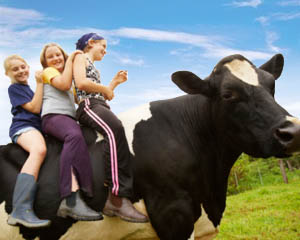So, you’re thinking about throwing in the towel at your city gig and moving to the country for some peace, quiet and fresh air. A shift in gear that gives you time to start work on that novel you’ve always wanted to write, raise some ducks and a cow or two and grow your own veggies.
You crave a quieter existence and the joys of hobby farming, but you want to do it without channelling Chevy Chase’s character from Funny Farm, whose attempts to embrace rural life are wrought with one disaster after another.
The good news is, with the right approach, it can be done successfully. According to the Victorian Department of Primary Industries, there are more than 60,000 “small lifestyle farms” operating across Australia, occupying around 20 per cent of agricultural land.

Hobby farms can range from a small block with a few horses to small working farms that provide a secondary source of income for the owners. Charlie Roberts from FarmStyle Australia, an online community where small farm owners seek and share knowledge, says many urban dwellers maintain small farms in rural areas close to major cities so they can maintain their regular jobs in town.
Charlie says raising livestock such as alpacas, sheep, goats and cows present an attractive option for first-time farmers.
“The idea of owning and raising naturally grazing stock seems to really appeal to people,” he says. “Miniature cattle breeds are popular with people who are farming for the first time, because they’re easy to handle and the infrastructure is manageable.”
Charlie advises anyone considering buying a hobby farm to be clear about what they want their property for before contemplating the sale ads. What you are willing to commit to in terms of work hours and the costs of things like equipment need to factor heavily in your decision.
“If you’ve decided on cattle, the farm has to have suitable infrastructure like cattle yards, loading ramps and adequate fencing,” Roberts says. “Buying land and then changing it to suit your purpose takes time and money. If you can work out your exact framework beforehand, you can select places that are suitable to look at.”
Ventures such as growing crops require an understanding of aspects like soil composition and knowledge around pest control, as well as access to clean water supplies and irrigation management.
Once you have a clear plan for what you want from your hobby farm, Roberts has these words of advice for finding the right property:
- Good communication with your agent is vital. Hobby farms can be located a long distance from where the buyer lives, so you need someone who can provide detailed information about the area as well as the type of property you are after.
- Make sure that you’re realistic about your ability to manage the land you purchase.It’s important that you understand the legal obligations of running a farm and elements such as caring for animals, identification, tracking and tagging systems, and local Council and State Government planning restrictions and building codes. There are also laws for things like controlling weeds and pests.
- Have the right expectations of moving to rural areas, and what that means for your lifestyle in terms of general infrastructure, like communications and roads.
People contemplating farm life can test the waters at events such as the NSW Farmers’ Association’s annual FarmDay, which invites city families to spend a day of hands-on experience running a farm.
The lifestyle and small holdings sections of real estate agents and websites such as realestate.com.au can provide starting points for exploring various property types, while farmbuy.com concentrates on the rural market and can connect you with agents who specialise in this area.
Being clear to your agent about what you are hoping to gain from a hobby farm and the time you have to dedicate to maintaining the property is crucial. It is also important you know exactly what you are getting for the purchase price, so that the cost for additional requirements of your farm are factored in.
Costs apart from the land itself include:
- property taxes, loan fees, business insurance
- set-up costs including machinery, livestock
- ongoing overheads like feed, drenching, tagging and identification processes
- disease prevention and vet visits.
Be aware that the land you purchase may come with an older home, so there may be costs associated with the upkeep of the house as well.
And, like any real estate purchase, a wise investment will hold you in good stead should you decide to sell, so elements such as surrounding infrastructure, facilities and the economical state of the region all come into play.
When applying for a loan, a broker who specialises in hobby farms can help negotiate on factors that can influence the bank’s assessment, such as the size of land and how much income you plan to generate from the farm. Organisations such as Select-A- Broker can assist with applying for a loan through a knowledgeable broker, free of charge.
Of course, finding your own piece of countryside doesn’t have to mean taking out a loan. You may be looking for the simple joy of making honey from your own bees or farming free-range eggs from a batch of healthy chickens.
About the author
Chelsea Roffey for Bigpond Money, a key contributor to this article was Charlie Roberts from Farmstyle Australia.



